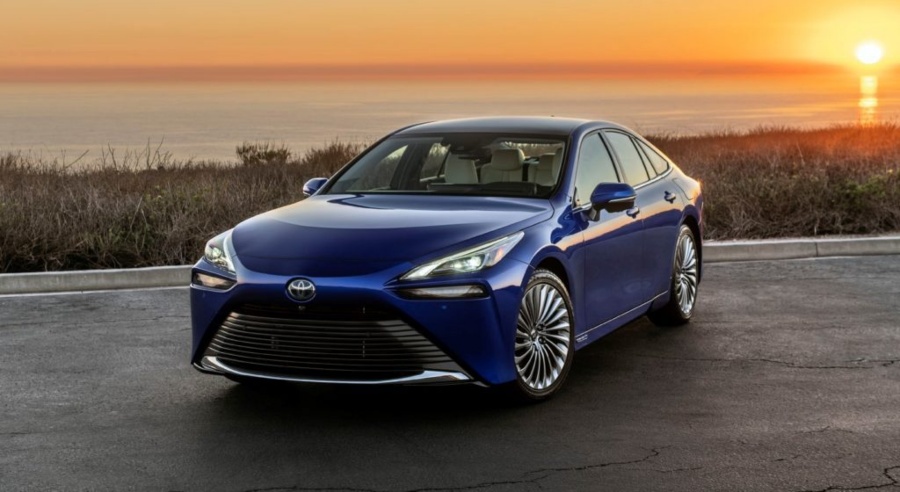
Airport looks to adopt hydrogen-fueled cars for its fleet, seek partnerships
Edmonton International Airport (EIA) plans to include hydrogen-fueled zero-emission cars in its operations fleet through a partnership with Toyota Canada that would help demonstrate and accelerate the use of hydrogen. This is part of EIA’s commitment to decarbonize transportation and drive towards net-zero.
EIA and its partners plan to purchase Toyota Mirai hydrogen-powered fuel cell electric vehicles (FCEVs). While the details have yet to be finalized, EIA hopes to determine the number of cars coming later this year and the airport will seek additional partnerships to adopt the use of these zero-emission vehicles. EIA will also explore building a level 2 hydrogen fueling facility to enable the service and maintenance of the vehicles on-site.
“EIA is excited to work with Toyota Canada with the goal of bringing their Mirai FCEVs into our fleet. We see EIA’s Airport City Sustainability Campus as an ecosystem that can help build the demand for hydrogen. We are committed to working with our partners to find ways to reduce emissions and we see hydrogen fuel cells to be a key technology to help achieve this goal. This will also tie-in to our work to bring hydrogen fueling stations and other technologies to our airport for the public.”
- Myron Keehn, Vice President Air Service, Business Development, ESG and Government Relations, EIA
“We commend Edmonton International Airport for considering the bold and innovative step to decarbonize their vehicle fleets using hydrogen. We believe their fleet could be yet another Canadian demonstration that FCEVs really are the perfect zero-emission solution for organizations with fleets of high-use vehicles.”
- Stephen Beatty, Vice President, Corporate at Toyota Canada
At the core of the zero-emission Mirai FCEV, hydrogen from the fuel tank and air entering from the intake grille meet in the fuel cell stack. There, a chemical reaction involving the oxygen in the air and hydrogen creates electricity, powering the Mirai. In the end, its only tailpipe emission is water. EIA operates a fleet of vehicles for transportation with the Airport City Sustainability Campus and its employee operations.
EIA has previously encouraged the use of alternative-powered vehicles at the airport. Many of the taxi vehicles that serve the airport are electric-hybrid vehicles. Going forward, EIA will seek ways for Airport City Sustainability Campus partners to adopt the use of hydrogen fuel cell electric vehicles. This support’s EIA’s goal of becoming carbon neutral under its commitment to The Climate Pledge.
About Edmonton International Airport
Edmonton International Airport (EIA) is a self-funded, not-for-profit corporation driving economic prosperity for the Edmonton Metropolitan Region. EIA is Canada’s fifth-busiest airport by passenger traffic and the largest major Canadian airport by land area. EIA’s Airport City Sustainability Campus is home to companies focused on tourism, entertainment, cargo logistics, manufacturing, sustainability, and technology development and commercialization. As a result, EIA generated an economic output of over $3.2 billion and supported over 26,000 jobs pre-pandemic. At its core, EIA believes equity and diversity is a strength and creating an inclusive space is both a privilege and is a fundamental responsibility. For more information, please visit: flyeia.com, follow @flyeia on Twitter, Instagram, Linkedin or Facebook.
About Toyota Canada
Since the introduction of the Prius in 1997, Toyota has led the auto industry’s electrification revolution. The company has sold more than 19 million electrified vehicles and remains the number one seller of electrified vehicles in Canada. Toyota is aggressively working toward making its North American plants carbon neutral by 2035. Already offering a wide range of carbon-reducing hybrid electric, plug-in hybrid electric and hydrogen fuel cell electric options for Canadian consumers, Toyota plans to offer 70 different electrified models globally by 2025. This lineup will include 15 zero-emission battery electric vehicles, starting with the bZ4X which will be available in Canada this summer.
Read the most up to date Fuel Cell and Hydrogen Industry news at FuelCellsWorks




